In Conversation: Ron OJ Parson, Rebecca Spence, and John Hoogenakker
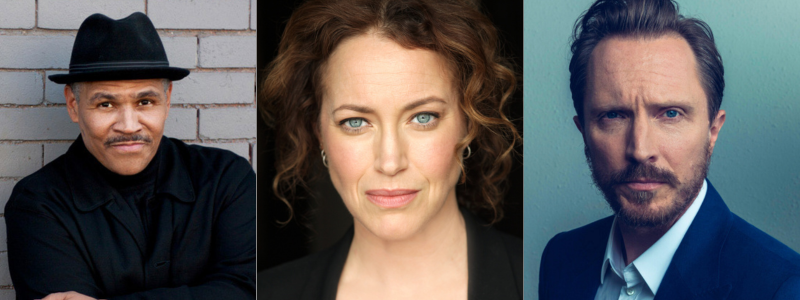
Director Ron OJ Parson discussed The Lion in Winter with Associate Director of Marketing Camille Oswald and Court’s own King Henry II and Eleanor of Aquitaine – John Hoogenakker and Rebecca Spence, respectively. Touching on major themes of power, legacy, relevance, and love, their conversation illuminated the staying power of this script and how there is a little Plantagenet in all of us.
What does The Lion in Winter have to say about power?
John: I was thinking about this line from the play, “We are the world in small.” Essentially, a nation is a human thing and rulers, especially autocrats, have the ability to make peace or make war. The idea that a personal slight, like many of the ones that get traded in this play, could affect the lives of hundreds, thousands, and possibly millions of people is a really scary thought. Now, this play is about the House of Plantagenet – so, effectively, a family – which means that they’re dealing with interpersonal relationships, relationships on a smaller scale. But, because of who this family is, the consequences of that family’s decisions could be very far-reaching.
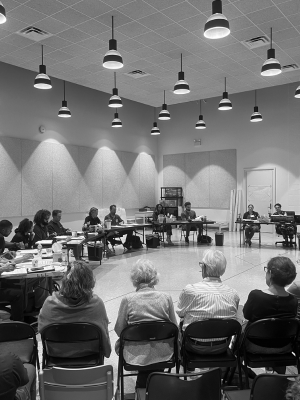
Rebecca: Exactly, and there are so many different forms of power in each scene informing those decisions. There are the people that think that their power has been ordained by God, there are people that have never had power that are willing to fight to get it. The other thing to consider is the different ways characters use their power: some rely on their age, some rely on beauty, strategy, brawn, what have you. Each character has within them so many different forms of power, so each scene is a test to see which one dominates. That’s the really delicate balance of each of these scenes: What is each character using to their benefit to gain advantage? It’s a delicate, delicate dance.
Ron: That’s what you get for hiring really smart actors – those answers are great! There’s a quote from Jimi Hendrix that comes to mind: “When the power of love overcomes the love of power, then we will have peace.” The Lion in Winter is still relevant within our modern political climate, and it still says a lot about the battle of power within a family. Everyone’s told me about the program Succession. I didn’t watch it [laughs], but people said that family goes through the same thing! I wanted this production to make us look at our own world, and I wanted to focus on what goes on in a powerful ‘dysfunctional’ family. I can’t imagine what’s going on behind the scenes with some of these major power brokers that are in politics today – we get to see the outside, but who knows what’s going on behind those closed doors! We’re making the audience a fly on the wall to see how a family operates in the midst of a power struggle.
John: An interesting fact I’d like to add: The Lion in Winter came out before Succession! [laughs]
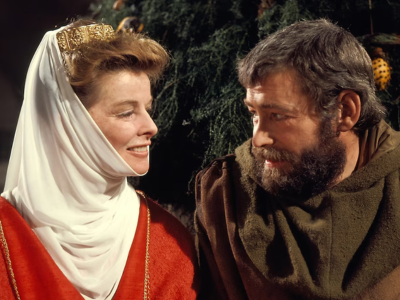
Ron: Yes, it came out way before! In fact, we’ve talked about how – when this came out in the 60s – this play was groundbreaking!
John: In the play, there’s an intimate relationship between two men, and that was groundbreaking to see on stage at this time. We also have these characters screaming and yelling at each other, threatening to kill one another, and this is just after the era of Leave It to Beaver and Father Knows Best!
This play might seem tame in comparison to where we are in this moment, but at the time, these sorts of interactions just weren’t portrayed on stage.
What does Lion teach us about love, pain, and the relationship between the two?
Ron: Even though people are yelling and screaming at each other, as John said, there’s actually a lot of love here! I try to stress the love in any production, and this production is no different.
Rebecca: Which speaks to how love and power are really tricky bedfellows! To truly love someone is to be vulnerable, right? That adds something to the mix of power, and succession, and relevance. That love creates a soft spot where you can really get hurt. Within these relationships, how does your character twist those to your advantage? These vulnerabilities become weapons, so love is yet another tool in that power equation.
Ron: It’s a thin line between love and hate. You can love somebody to death, so to speak, and they can still test you.
John: And a person can become addicted to both of those feelings in equal parts, as if their relationship somehow doesn’t work unless they’re feeling some sort of pain as a result. These people in this play are all broken by their desire to gain power and by their willingness to exploit the love that others have for them to their own ends. They have to hurt one another to get what they want, while we believe – as we’re approaching this production – that what makes those interactions hurt even more, what makes them cost more, is that the characters, at their core, actually love one another.
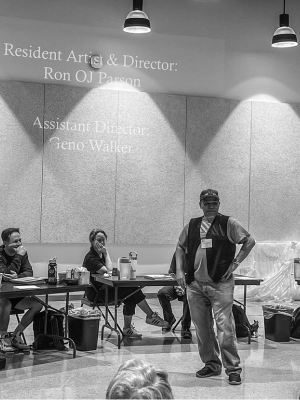
What role does humor play in this production?
Ron: That conflict between love and pain is what creates humor! If you don’t find the humor in life, you go crazy, so we have to find the places where we can laugh at what we’re going through. You have to have humor in this production – even if it’s dark, or ironic – to deal with the pressure and the angst of everything else that’s going on.
Why do we enjoy watching people scheme, plot, and deceive? How is that satisfying for the audience and how is that satisfying for you, as artists?
John: We, as humans, are a scheming breed, so watching bad people do bad things to each other on stage is pleasing to us!
Ron: That’s what theatre does, and should do, in my opinion: you shouldn’t know what’s going to happen next. It should be exciting! Henry could smile at you one minute and stab you the next!
Rebecca: As artists, it’s so much fun to play, too! The human condition is to defend yourself by any means possible, but we have been conditioned to be thoughtful and curb all of those immediate thoughts and impulses. We have learned how to behave in a society – well, some of us have. This kind of production allows us, as artists, to say things that we’ve been taught to suppress and we get to say them without actual consequence. It’s delightful when you’re given the opportunity to do it onstage dramatically in a really sarcastic, or intellectual, or pithy way, because it’s another form of release.
John: That’s part of what people get out of a play like this: they get to see aspects of their psyche that – thankfully – lie dormant. They’re reminded, Oh, that’s why I don’t make that choice every day.
Legacy is a central theme of this production. How would you describe the legacy of this play, and your personal relationship to legacy?
Ron: As far as legacy, for me, I acted in this play back in the 70s. I played John; I was only 22 years old; and it was in a production in Williamsport, Pennsylvania. Most people know Williamsport as the home of the Little League World Series. I was glad to be there at that time, because a few years ago, we had lost the playoffs and I missed out on being in the Little League World Series so, when I got there, that was all I was thinking about [laughs].
Back then, we weren’t thinking about non-traditional casting – it was a lot simpler than that: You play the king! You play this! You play that! Unfortunately, out in the world, sometimes people pigeonhole you: Oh, they’re a comedic actor. They’re a Black director. They do this, they do that. But I never had that mindset. For me, we just do plays. We do theatre. So this one was one play that I wanted to tackle, and tackle in today’s world – let’s see what we can do with it!
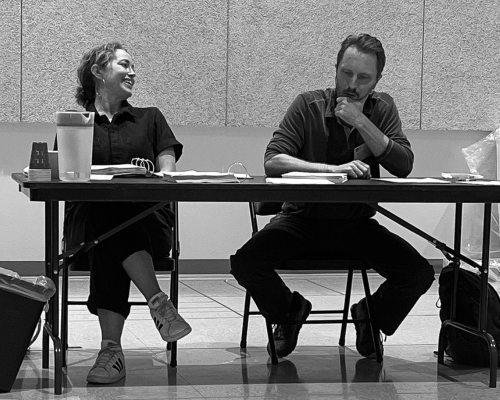
John: This is a very current play. It’s written with a lot of fun anachronisms in it that give you license to play around and build. As a personal goal, I want to make Henry’s journey of raging against the sunset accessible, for it’s a very human place to find oneself: trying to stay relevant, trying to stay alive and in the conversation, and trying to maintain control.
Rebecca: In terms of the role of Eleanor, the two women that played her on film – Katharine Hepburn and Glenn Close – are titans in the industry, these remarkable powerhouses, so these are very large shoes to fill [laughs]. Even the roles themselves are based on titans in history, so the challenge is to bring honor to the role and put your own humanity into it. Legacy is the handing down of what you know, and then what you can add to it, so the challenge is finding the moments within scenes, moments between characters, that ring true to me, as a woman; as someone who wants to stay relevant; who wants to be considered; to be seen. We all just want to be seen.
The Lion in Winter runs from November 3 – December 3, 2023 and tickets are available now! Subscription packages including this production are also available for purchase online or by calling the Box Office at (773) 753-4472.
Join one of the most famous dysfunctional families in history for the holiday season!